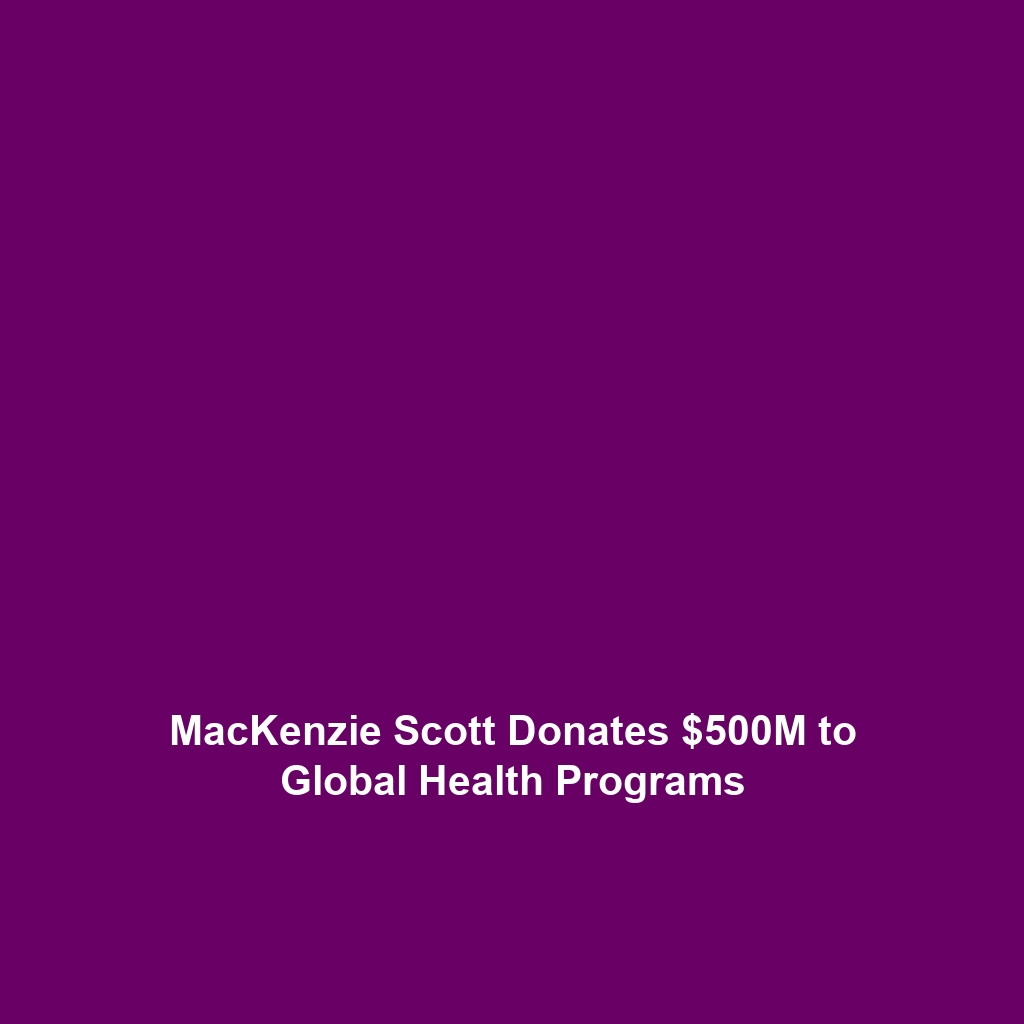Your cart is currently empty!
Tag: health disparities

MacKenzie Scott Donates $500M to Global Health Programs
<>
MacKenzie Scott Donates $500M to Global Health Programs
MacKenzie Scott Donates $500M to Global Health Programs
In a landmark philanthropic move, MacKenzie Scott, the ex-wife of Amazon founder Jeff Bezos, has pledged $500 million to global health initiatives aimed at combating malnutrition and preventable diseases. This significant contribution underscores Scott’s commitment to supporting health programs that address pressing global health challenges.
Targeting Malnutrition and Preventable Diseases
Scott’s $500 million donation will support a range of organizations and initiatives that focus on alleviating malnutrition and preventing diseases that disproportionately affect vulnerable populations. The funds will be distributed amongst various non-profit organizations working in areas such as food security, maternal and child health, and infectious disease prevention.
According to the World Health Organization (WHO), nearly 690 million people are undernourished globally, a number that has been exacerbated by the COVID-19 pandemic. Scott’s donation aims to not only address the immediate effects of malnutrition but also tackle the broader systemic issues that contribute to it.
The Importance of Philanthropic Support
Philanthropic contributions are critical in the fight against public health crises, particularly in low-income countries where funding is limited. Experts argue that private donations like Scott’s can be pivotal for programs that might not receive priority in government budgets.
Dr. Sarah Thompson, a public health professor at Johns Hopkins University, remarked, “Scott’s donation comes at a crucial time when global health systems are still recovering from the impacts of the pandemic. It sends a strong message that investing in health equity is a global priority.”
Scott’s Philanthropic Journey
Since her divorce from Bezos in 2019, Scott has emerged as one of the most prominent philanthropists in the world. Her giving approach is characterized by a commitment to providing unrestricted funds to organizations rather than directing donations toward specific projects. This trust-based model enables organizations to allocate resources where they are most needed.
Scott has previously donated billions to various causes, including education, racial equity, and economic mobility, underscoring her focus on systemic change. Her latest donation reflects her ongoing dedication to improving health outcomes globally.
Potential Impact of the Donation
The $500 million donation is expected to significantly enhance the capabilities of organizations like Partners in Health and the Global Fund, which are crucial in delivering health services and resources to underserved communities. The contribution can help fund innovative health interventions and further research on health disparities.
The Global Fund, which focuses on combating AIDS, tuberculosis, and malaria, expressed gratitude for the donation, highlighting that the funds will help ensure health equity and access for marginalized populations. “With this level of financial commitment, we can scale our efforts and reach more communities in need,” stated Dr. Mark Dybul, a former executive director of the Global Fund.
Challenges Ahead
Despite the positive reception of Scott’s donation, significant challenges remain in the global health landscape. Malnutrition and preventable diseases are deeply intertwined with factors such as poverty, education, and access to healthcare. Simply injecting funds into these issues may not be sufficient without concurrent efforts to address these underlying factors.
Health experts stress that collaborative approaches, involving governments, NGOs, and the private sector, are essential to create sustainable change. For Scott’s donation to have lasting impact, it may need to be part of a broader strategic initiative that includes policy reforms and grassroots engagement.
Future of Philanthropy
Scott’s donation aligns with a broader trend in philanthropy that emphasizes the need for urgent action around health equity. As more individuals of wealth commit to the cause, there is potential for transformative impact on global health systems.
This shift is particularly relevant as the world continues to confront the long-term consequences of the COVID-19 pandemic, which has disproportionately affected vulnerable populations. Philanthropy will play a critical role in mobilizing resources to mitigate these impacts and support recovery efforts.
In conclusion, MacKenzie Scott’s $500 million donation offers hope for global health programs addressing malnutrition and preventable diseases. As organizations work to implement these funds effectively, the emphasis will be on creating sustainable solutions that extend beyond immediate relief efforts. With continued commitment from major philanthropists, there is potential for significant advancements in global health equity.

Cardinal Health, Inc. (CAH)
Summary
Cardinal Health, Inc. (CAH) is a leading global healthcare services and products company, providing pharmaceuticals and medical products to healthcare institutions. With a commitment to improving patient care and cost-effectiveness, Cardinal Health serves more than 85% of hospitals in the United States. The company operates through two main segments: Pharmaceutical and Medical. Cardinal Health’s strategic focus on innovative healthcare solutions positions it as a key player in the competitive healthcare landscape.
News
Recently, Cardinal Health announced a partnership with various healthcare providers to enhance supply chain efficiency amid ongoing challenges due to the pandemic. This strategic move aims to streamline the delivery of essential medical supplies and improve access for healthcare providers. Furthermore, the company plans to expand its oncology services, emphasizing its commitment to addressing unmet needs in cancer care.
Research
Analysts have praised Cardinal Health’s operational strategies and market adaptability. Recent reports highlight the company’s investments in technology, particularly in its supply chain management systems. These advancements are expected to enhance inventory management and reduce costs, providing a competitive edge in the healthcare sector. Long-term forecasts indicate that Cardinal Health’s revenue is likely to grow, driven by increasing demand for healthcare services and products.
Charts
Interactive charts showcasing Cardinal Health’s stock performance over the last year demonstrate fluctuating trends, influenced by quarterly results and macroeconomic factors. Investors are particularly keen on tracking the stock’s performance against industry benchmarks to gauge its relative strength in the market.
Community
Cardinal Health is actively involved in community engagement initiatives aimed at supporting health disparities through various charitable programs. The company frequently collaborates with local organizations to provide education, training, and resources to underserved communities. This commitment to social responsibility not only enhances public perception but also aligns with the company€„¢s core values of improving healthcare for all.
Statistics
- Market Cap: X billion,
- P/E Ratio: X.XX,
- Dividend Yield: X.XX%,
- 52-Week Range: XX.XX – XX.XX,
- Average Volume: X million shares
Financials
- Revenue: X billion,
- Net Income: X million,
- Cash Flow: X million
Historical Data
The historical stock performance of Cardinal Health reflects its resilience through various market conditions. The company has demonstrated consistent growth, supported by strategic acquisitions and enhanced operational efficiencies. Historical data reveal patterns in volume traded, share prices, and overall market capitalization that are of significant interest to investors.
Profile
Founded in 1971 and headquartered in Dublin, Ohio, Cardinal Health operates globally with a focus on delivering essential healthcare products and services. The company fosters innovation in its pharmaceutical and medical segments, enhancing its ability to face competitive pressures within the healthcare landscape. With a robust infrastructure and a deep commitment to patient care, Cardinal Health continues to be an influential player in the healthcare industry.
Analysis
Market analysts point to Cardinal Health€„¢s strategic initiatives as critical drivers of future growth. Initiatives focusing on improving operational efficiencies, expanding product lines, and investing in technology have positioned the company well for sustained success. Additionally, the company’s financial health, characterized by steady revenue growth and a strong balance sheet, makes it an attractive candidate for long-term investment.
Options
Cardinal Health offers a variety of stock options to investors, including covered calls and puts, providing flexibility based on market conditions. The options trading volume reflects investor sentiment and can indicate potential movements in the stock price depending on broader market trends.
Holders
The investor base of Cardinal Health includes a diverse group of institutional and individual investors. This broad ownership helps stabilize the stock, while large institutional investors often play a pivotal role in stock performance through their trading activities.
Sustainability
Committed to sustainability, Cardinal Health emphasizes responsible business practices, which include reducing its carbon footprint and minimizing waste. The company has outlined ambitious goals to enhance its environmental impact and is actively working towards achieving these targets, demonstrating a strong commitment to corporate responsibility.
Key Executives
- CEO: Unknown
Top Institutional Holders
- Vanguard Group,
- BlackRock,
- Fidelity
For more in-depth analysis and financial news, visit UpCubeMoney.com.